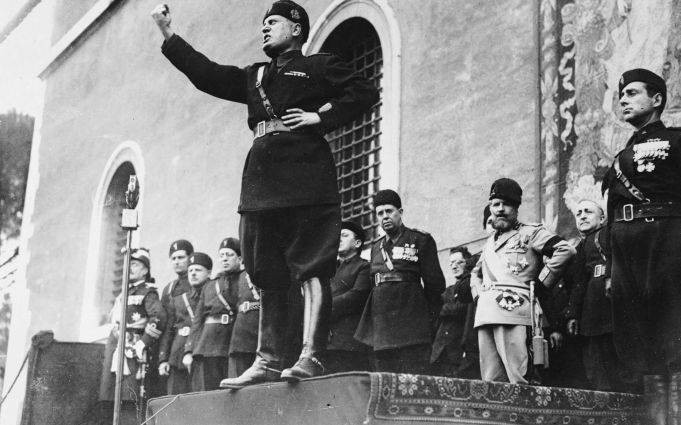Italy marks 100 years since Mussolini's March on Rome
100 years since Mussolini's March on Rome: what really happened and why it still matters today.
This week marks the centenary of the March on Rome but while Mussolini's fascist dream might be over, the chequered legacy of that day lives on.
ROME: 100 years ago, ragged fascist squads converged on the outskirts of Rome, ready to seize power on behalf of their leader Benito Mussolini.
In the face of the marchers’ supposed fascist might, the Italian liberal government had resolved to reply with force. Italy’s prime minister Luigi Facta hurried to the Quirinal Palace to get King Victor Emmanuel III to sign a decree of martial law. This would have deployed the army to defend the city from the fascists, but the anticipated battle for Rome did not materialise.
In what would become a historic loss of nerve, the weak King Victor Emmanuel III overruled his prime minister's request to declare a state of siege and simply installed Mussolini as the leader of the government - no actual coup d’état was required.
This Friday - on 28 October 2022 - Italy will mark the centenary of the March of Rome. It is a significant milestone in Italy’s modern history, not least because it was the birth of the fascist dream but it also paved the way for the rise of a totalitarian evolution that would spread across Europe, and consequently, and perhaps most seriously, to Germany ten years later.
In a twist of historical coincidence, this year the event has renewed political intensity.
It falls on the week in which Giorgia Meloni assumes her responsibility as prime minister, becoming the first far-right leader of Italy since the world war two. It is a week in which Italy's fascist past seems to be colliding with its present.Sitting in his office at the National Association of Italian Partisans, ANPI, in the Prati district of Rome, Fabrizio De Sanctis says: “The March on Rome is a very important day to remember. First and foremost in order that we don’t have to relive it.”
On sale in newsstands in Rome today not one calendar devoted to #Mussolini but two. pic.twitter.com/RtsGGrGJjC— Wanted in Rome (@wantedinrome) October 13, 2022
De Sanctis is the president of the local Rome section of ANPI, the organisation set up by members of the Italian Resistance in 1945 to preserve the memory of the partisans' fierce battle with fascism during world war two. Today, as Italy continues to stumble through endless economic and political crises, he sees his work as important as ever.
“It’s vital to continue to reinforce antifascist safeguards. Fascists came to power in Italy during a deep social crisis… and today we can see a very large crisis looming too,” he says.
He is not wrong. In the months leading up to Mussolini's fateful power grab, the pre-Fascist political leadership had lost confidence in itself. The country was actually on the brink of civil war. Four fears of left-wing and then right-wing unrest had left the establishment, especially King Victor Emmanuel III, weary.

De Sanctis recognises that the parallels end there. Comparisons of the past often obscure the realities of the present. Nevertheless, occasional outbursts of right-wing violence, such as the assault of the CGIL trade union headquarters in Rome on 9 October 2021 and the right-wing mass media, pose new challenges to the work of antifascists like De Sanctis.
Unlike in countries such as Germany and Japan, there’s often a somewhat slack, even indulgent attitude to Mussolini’s fascism in Italy. The anniversary of the March of Rome is often commemorated by vigils, ceremonies and demonstrations by those on the right, as well as protests on the left.
This is partly because neo-fascists today venerate the revolutionary mythology of the day: the march represents a thread linking Mussolini to their modern reactionary and revolutionary politics.
Speaking on the phone with the president of the extreme right and proudly fascist group Azione Frontale, Ernesto Moroni, tells me that: “The March of Rome is the emblem of fascism - it’s the revolutionary founding principle that united the country.”

But as recounted today, 28 October 1922 was less of a heroic revolutionary enterprise and more of a low-key excursion by a ragtag group of blackshirts who arrived mostly by train. Far from being at the vanguard of the conquest of power, Mussolini had actually hung back in Milan, ready to flee the country to Switzerland if the march failed.
For Dr Giorgio Potì, of The American University of Rome, “fascist mythology presents the day as a revolution but in reality, there was almost no subversive potential in the march - it could easily have been crushed by the king...Mussolini became prime minister in perfect compliance with Italy's political system.”
This is not something to underestimate. The success of the March of Rome was a large part thanks to the silent acquiescence of much of the establishment: the church, the judiciary, the army, and most importantly the monarchy, who saw Mussolini as a lesser evil than socialism.
A recent documentary by filmmaker Mark Cousins, entitled The March on Rome (2022), relates this complacency with America’s Capitol riots, and the concession that Donald Trump was hoping to force in 2021.
As we approach the hundred-year milestone, Italians are forced to reflect on the legacy of the March of Rome.
There is a conspicuous uneasiness about the anniversary. Unlike in other years, there are few planned demonstrations or public ceremonies from the far-right marking the day.
Giorgia Meloni, who once described Mussolini as the best politician of the last 50 years, is very eager to distance herself from the fascist regime. In her first speech as prime minister, Meloni issued her strongest condemnation of fascism, saying she had never sympathised with anti-democratic regimes.
It is clear the prime minister is trying to make the tricky reconciliation between her position as a stateswoman of the West with her cultural identity in the far right. In light of the historical political week, the burning question is whether she will go far enough.
In the meantime, De Sanctis and the National Association of Italian Partisans are clear, if anything discreditable happens on the day of the anniversary, “we are ready to react,” he says.
By Charles Seymour


















